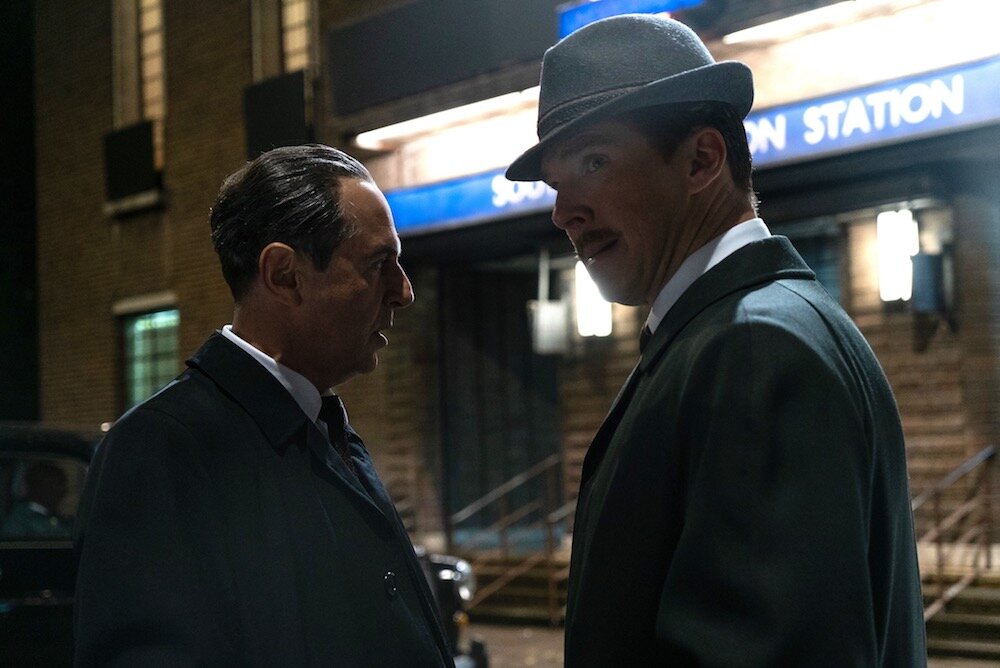Director: Dominic Cooke
Writer: Tom O’Connor
Cast: Benedict Cumberbatch, Merab Ninidze, Rachel Brosnahan, & Jessie Buckley.
Feature films are not documentaries. Regardless of what a title card reads at the beginning of a biopic, period picture, or other work “based upon” or “inspired by true events,” by now most film lovers know that you shouldn't consider a movie historical Cliff's Notes. If you want to know what really happened, it’s best to pick up a nonfiction book instead.
Discovering this, it becomes harder to judge fictionalized “true stories” for when and where they decide to adhere to or deviate from the real turns of events or players involved. A valuable rule of thumb for me personally, but as the internet likes to say “your mileage may vary,” is that even when minor details are changed or new subplots are added for dramatic effect, it still has to feel true within the cinematic world where the story exists. Namely, any fictional changes made in a movie should not pull you out of the overall narrative.
Unfortunately, this is one of the major ways where director Dominic Cooke's otherwise superbly acted faux true-life Cold War drama “The Courier” goes so wrong. A film about a British businessman (Benedict Cumberbatch) who's recruited to transport top-secret documents from a Soviet officer asset (Merab Ninidze) back to his MI6 and CIA handlers in the UK during the Cuban Missile Crisis, “The Courier” is utterly fascinating on the page but only mildly successful on the screen.
Anachronistic at best, the filmmaker’s decision to cast the unquestionably gifted Rachel Brosnahan as a young female American CIA agent working with MI6 to run foreign operatives in Russia in an era where the people doing so were men feels primarily like tokenism. And indeed, in the film's production notes, even “The Courier” screenwriter Tom O'Connor admits that “casting another male wasn't the most compelling version of the story to tell these days.”
Reading this acknowledgment is annoying to me for several reasons. As women, we have our own worthwhile stories to bring to the screen and don’t need “The Courier” to shortchange the roles we played in the given period just because we weren't running international spy-rings.
Yet even if O'Connor and Cooke weren't trying to be overly trendy in the post-Me Too era, which most female filmgoers are quick to see through, Brosnahan's CIA agent in “The Courier” feels so inauthentic that her mere presence – and the talented actress's strong performance – makes her minor character far more interesting than everyone else's. Obviously, this couldn't have been the filmmaker's intention all along or they would’ve centered the film on Brosnahan instead of “The Courier.” As soon as she appears onscreen, she easily overshadows Cumberbatch's rather dry everyday businessman, the woefully underwritten Greville Wynne who is purported to be the protagonist. But when it comes to the film's eponymous courier, in this regard, we quickly deduce that she is far from alone.
A weak main character as written, further research reveals that Greville Wynne is a relatively blank slate. Following the events of the film, it seems that not only did MI6 not thank the businessman or disclose much about his international pursuits but the real Wynne wrote two different memoirs that have been largely debunked, likely owing to a mental decline following his harrowing days as a citizen spy.
Although he’s undoubtedly an unexpected British hero worthy of greater study, Wynne is done a disservice in “The Courier,” once we’re introduced to Cumberbatch's enigmatic counterpart in the form of Merab Ninidze's Russian officer Oleg Penkovsky early on. Immediately engaged in the plight of this man putting his family, career, and life on the line for his principles on his own accord, not only does Penkovsky steal focus from our British courier throughout, it becomes painfully clear he would've made a much more gripping main character overall. Of course, the stakes are similar for Wynne but being that Penkovsky is mostly in Russia makes his dual role vastly more terrifying.
Imbued with an intentionally dull visual palette, which has a lethargic effect on the film as a whole, despite Cumberbatch's immense range as an actor, whenever “The Courier” follows Ninidze's Penkovsky instead of Wynne, Cooke's work roars back to life. Sadly, however, these moments are as short-lived as they are few and far between.
An altogether underwhelming, workmanlike endeavor, the film marks a disappointing sophomore effort for the director of the impressive '17 sleeper “On Chesil Beach.” Helmed by a man with an extensive background working with actors in the theater, “The Courier” is augmented by the strength of Cooke's ensemble cast, including Jessie Buckley as Wynne's stylish wife who brings a bit of vivacity to the film’s visually dour proceedings.
While on the one hand, it's perhaps worth watching for viewers who are curious about Cold War foreign policy and international relations, on the other, what we have here doesn’t really work as a film. Despite being content as ever to look the other way for the sake of artistic license, the faux factual "Courier" just doesn't entertain us enough to warrant being trendy, UK-centric, and safe rather than unapologetic, international, and real.













